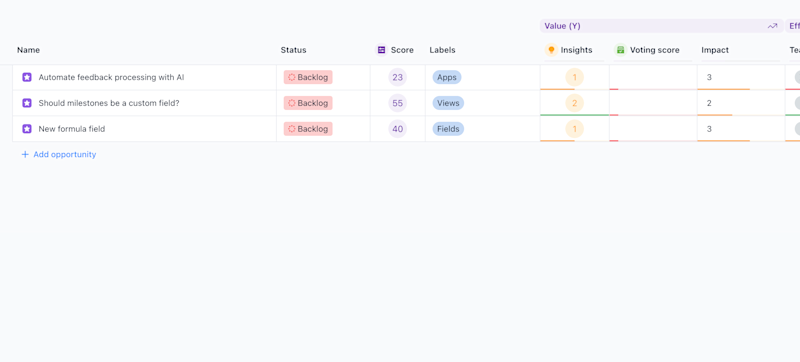13 Surprising Stats About Product Management (And What They Actually Mean for You)

The role of product management is evolving at a rapid pace, driven by the rise of artificial intelligence and new technological advancements. The integration of AI in product management is revolutionizing how we approach product development, customer insights, and strategic decision-making. Today’s product managers are pivotal strategists who leverage cutting-edge tools to drive efficiency and innovation.
New trends in product management include a heightened focus on product-led growth, enhanced product operations, and the increasing significance of AI. Even the "end" of product management was a trend in the recent years with the PM role shifting in major companies like Airbnb.
Remote and hybrid work environments are now the norm, increasing the demand for more effective communication and collaboration tools. Looking to the future, product managers must be agile, data-driven, and equipped with the right tools to navigate the complexities of their roles.
Here are some fascinating statistics that shed light on the current state of product management and what they mean for you.
TL;DR
AI is set to have a long-lasting impact on product management (92% of PMs).
Competing objectives (56.4%), insufficient time (50.8%), and lack of role clarity (35.0%) are top challenges for PMs.
Product management is ranked the 4th best job in the US by Glassdoor (2023).
65% of PMs find roadmapping the most difficult task.
PMs spend 45% less time on strategy than desired, with 52% spent on unplanned activities.
16.4% of PMs leave jobs due to bad team culture.
Optimizing product management processes can increase company profits by 34.2%.
Over 60% of PMs work without formal product management processes.
37.9% of PMs struggle with managing their backlogs.
8% of Harvard Business School grads took product management roles in 2022.
Only 5% of PMs know how to code.
60.3% of executive leaders partially understand the value of PMs.
Only 28% of PMs believe they have an optimized product-development process.
13 surprising stats about product management (and what they actually mean for you)
92% of product managers think AI will have a long-lasting impact on product management
According to our report on AI's impact, 92% of product managers believe AI will significantly influence product management, with many viewing it as an opportunity for workflow improvements and enhanced product discovery.
Read the full report: The Impact of AI On Product Management.
56.4% of PMs struggle with competing objectives within the organization
The primary challenges faced by product managers include competing objectives within the organization (56.4%), insufficient time (50.8%), and a lack of role clarity (35.0%). These obstacles highlight the need for clear communication, effective time management, and well-defined roles within teams to ensure product managers can perform their duties effectively and drive successful product outcomes.

In 2023, Glassdoor ranked the product manager position as the 4th best job in the United States
In 2023, Glassdoor ranked the product manager position as the 4th best job in the United States, highlighting the role's growing importance and attractiveness. This recognition underscores the increasing demand for skilled product managers and the significant impact they have on business success.
65% of product managers consider roadmapping to be the most difficult task of their role
According to Gitnux 2023, 65% of product managers find roadmapping to be the most challenging aspect of their role. The complexity of balancing long-term vision with short-term priorities requires robust tools and clear communication to ensure that all stakeholders are aligned and informed throughout the product development process.
Here's a list of 9 product roadmapping tools that can make PMs lives (much) easier.

Product managers spend 45% less time on strategy than they’d like
A survey by Pragmatic Institute revealed that product managers spend significantly less time on product strategy and strategic activities than desired, with only 8% achieving their strategic time goals.
PMs spend 52% of their time on unplanned "fire-fighting" activities (UXcam 2024).
This highlights the need for tools that streamline administrative tasks, enabling PMs to focus more on strategy.
16.4% of PMs leave their jobs due to bad team culture
A survey by the Product Management Festival found that 16.4% of product managers leave their roles due to poor team culture. Effective communication and relationship-building are crucial to mitigating internal politics and fostering a positive team environment.
A fully optimized product manager could increase company profits by 34.2%
Research indicates that optimizing product management processes can lead to a significant increase in company profits, averaging 34.2%. This underscores the importance of investing in standardized processes and effective PM tools.

Over 60% of product managers work in organizations without formal product management processes
A report from Productside revealed that over 60% of product managers work in organizations with ad hoc or non-existent product management processes. This presents an opportunity for PMs to pioneer new, efficient ways of working.
37.9% of product managers say their backlog is a jumble
Nearly 40% of product managers struggle with managing their backlogs. Leveraging tools like airfocus can help prioritize tasks and create clear, actionable roadmaps, making backlog management more efficient.

8% of Harvard Business School graduates took a job in product management
In 2022, 8% of Harvard Business School grads secured roles in product management, highlighting the increasing allure of this career path. The growing interest among elite graduates underscores the need for current product managers to continuously demonstrate their impact and adapt to a competitive landscape.
Only 5% of product managers know how to code
Despite debates about the necessity of technical skills, only 5% of product managers know how to code. However, gaining a basic understanding of coding can enhance collaboration with development teams and improve overall product management effectiveness.
60.3% of executive leaders only have a partial understanding of the value a product manager brings
Despite the critical role product managers play, 60.3% of executive leaders have only a partial understanding of their value. It’s essential for PMs to communicate their impact clearly and effectively to gain the recognition and support they deserve.
Only 28% of product managers believe they have an optimized product-development process
According to Gitnux 2024, only 28% of product managers believe they have an “optimized” product-development process. However, the rapid evolution of product management tools is offering hope. These tools now provide more features and better support for daily tasks, from prioritization tools to centralized databases for customer feedback. This advancement is revolutionizing the way PMs work and improving product development processes.
Here is a list of 35 of the best product management tools compared.
To sum up...
It's thrilling to be in a field that feels like a rollercoaster ride. There are always turns you can't expect!
These statistics show just how fast things are changing in product management. While challenges abound, the rise of AI and new tech tools is opening up incredible opportunities for growth and innovation. Our goal should always be to ask ourselves how we can use these advancements to work smarter, make better decisions, and drive significant results for our businesses.
Embracing these tools and demonstrating our value will help us tackle today's challenges and also lead our organizations into a future of successful and innovative product management. Buckle up and enjoy the ride!
A version of this article was published in April 2019. Last updated in June 2024.
Valentin Firak

Read also

Experience the new way of doing product management

Experience the new way of doing product management






